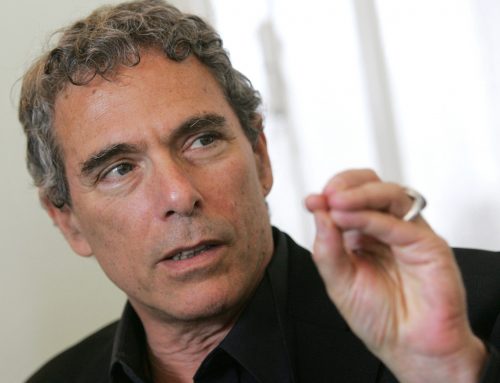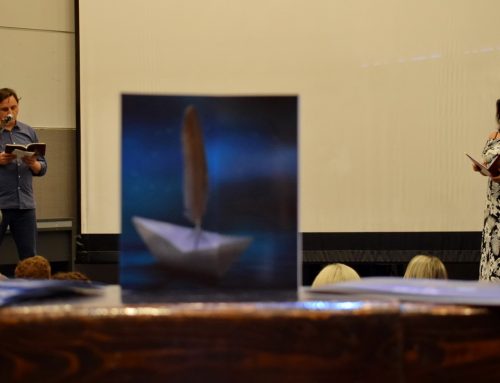On World Poetry Day, 21st March at the press conference held in the Macedonian Academy of Sciences and Arts was announced that Polish poet Adam Zagajewski is the winner of the “Golden Wreath” award 2018 of Struga Poetry Evenings.
The award will be presented on the international poetic readings “Bridges”, as a part of the Struga Poetry Evenings Festival that will be held from 22nd – 22th of August 2018.
Adam Zagajewski 1945
Polish poet, novelist, and essayist
Adam Zagajewski is considered the pre-eminent poet of the generation of Polish writers born after World War II. His literary career began with the protests that swept Poland in the late 1960s and early 1970s, and was primarily concerned with the political struggle to overturn totalitarianism. An exile since 1982, his later poetry addresses themes of both historical and metaphysical alienation. Balancing the concrete and the abstract, irony and mysticism, his poetry no longer advocates a single truth but chronicles the difficult and painful search for meaning in an unsettled world.
Biographical Information
Stanislaw Baranczak identifies Zagajewski as a member of “the generation whose birthdate coincides with the establishment of the Communist order and whose youth was spent rebelling against it.” Zagajewski was born on June 21, 1945, in Lvov, in eastern Poland. When Eastern European borders were redrawn after World War II, Lvov became part of the Soviet Ukraine. By 1946 his family was living in Gliwice in western Poland. Zagajewski attended university in Cracow where he was also an editor of the journal Student. In March 1968 he participated in student protests against censorship, and this experience shaped his writing. A prominent voice of protest during the early 1970s, Zagajewski was eventually blacklisted by communist authorities. By 1975, he was editing an underground literary periodical called Zapis (The Record). He lived in Western Europe for several years, returning to Poland in 1981. Martial law was imposed soon after he arrived, and he did not manage to leave again for several months. He now divides his time between Paris and Houston, Texas, where he teaches at the University of Houston for part of each year.
Major Works
Zagajewski first came to prominence in Eastern European literary circles for attacking the generation of Polish poets that preceded him. As a member of a literary movement called the New Wave, he argued that poetry should address the social and political needs of the present day. In 1974 he and Julian Kornhauser published Swiat nie przedstawiony (The World Not Represented), a collection of essays criticizing older authors for endorsing an abstract, contemplative poetry that failed to do enough to change the totalitarian regime in Poland. Zagajewski maintained that poetry should remain focused on the “here and
now,” and he advocated for a direct and unambiguous poetic language to represent the truth about current conditions in Poland. Straight talk would, he believed, undo or subvert the traditional “double-speak” of the communist party. This kind of language characterizes his first two collections of poetry, Komunikat (1972; Bulletin) and Śklespy miesne (1975; Meat Market).
Following the imposition of martial law and the beginning of his exile in Paris, Zagajewski began what Adam Kirsch called his “flight from history.” He became increasingly concerned with defining a mission for poetry that encompassed, rather than served, politics. Tremor: Selected Poems (1985) includes the poems he wrote during his first few years in Paris. His first book translated into English, Tremor transcends the poetry of protest and confronts the multiplicity of individual experience. During the 1980s and 90s, his poetry became increasingly contemplative and metaphysical. In an essay published in Solidarity, Solitude (1990), Zagajewski writes “We have to conquer totalitarianism in passing, on our way to greater things …”; his focus shifted from the limitations of a communist regime to the psychological, moral, and spiritual restrictions on human existence. The poetry in Canvas (1991) displays a fascination with the mysterious or divine aspects of people. Here Zagajewski expresses his frustration with our conceptual development, rather than our political progress, as he writes of “dreams of imagination / homeless and mad.” The theme of imaginative alienation continues in Mysticism for Beginners (1997). In these poems, Zagajewski attempts to restore mystery and ecstasy to modern poetry, as he expresses the conflict between his urge to accept the world and his impulse to flee from it.
Critical Reception
The arc of Zagajewski’s career, from politics to mysticism, has shaped the critical debate about his poetry. In an introduction to Tremor, Czeslaw Milosz observed that protest poetry is “noble-minded, but often one-dimensional,” and he praised Zagajewski for moving beyond political poetry. Most critics have echoed this praise, though all agree that history and politics retain an important role in his work. Scholar and poet Stanislaw Baranczak states that the historical context “cannot really be subtracted from Zagajewski’s poems.” Poet Robert Pinsky considers Zagajewski’s view a recreation of the historical within the mundane, stating that it’s “an immense, sometimes subtle force inhering in what people see and feel every day.” Critic Adam Kirsch points to Zagajewski’s interest in mysticism as “the natural consummation of the private, the ahistorical,” emphasizing Zagajewski’s synthesis of the concrete and factual with other, more personal opinions.
Zagajewski’s poetry has frequently been compared to the work of English metaphysical poets such as John Donne, who often transformed sensual imagery into abstract metaphor. One critic, Eva Hoffman, admires his quest for transcendence that frequently begins with a concrete image: “The movement from a specificity of physical images to a moment of abstraction is characteristic of Mr. Zagajewski’s poetry; it corresponds to his delight in the sensuous surfaces of things and his urge toward a disembodied, spiritual insight and for a breaking out of the self.” Several critics have observed that Zagajewski’s work celebrates the process of discovery, and the theme of transcendence may be what connects politics and metaphysics in his poetry. By contemplating people confined by the social and political constructs that evolved throughout history, he arrives at a deeper and more abstract understanding of the human experience. “Zagajewski may be looking at Eastern Europe,” Steven Birkerts writes, “but his gaze wraps itself around the whole globe.”









